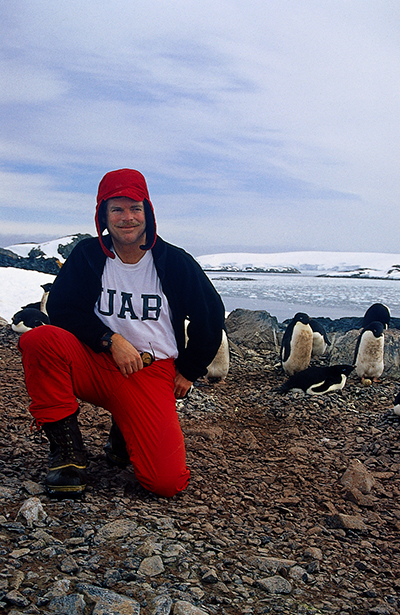Media contact: Alicia Rohan
 Jim McClintock, Ph.D.Editor’s note: Jim McClintock, Ph.D., a professor of polar and marine biology at the University of Alabama at Birmingham, is one of 25 scientists nationwide developing a definitive report on the effects of climate change and leads annual educational Climate Change Challenge cruises to Antarctica.
Jim McClintock, Ph.D.Editor’s note: Jim McClintock, Ph.D., a professor of polar and marine biology at the University of Alabama at Birmingham, is one of 25 scientists nationwide developing a definitive report on the effects of climate change and leads annual educational Climate Change Challenge cruises to Antarctica.
The notorious Drake Passage between Antarctica and South America was pummeling our research ship with 25- to 30-foot waves and gale-force winds gusting to 60 knots. Our team of 24 American scientists and science support staff had departed the U.S. Palmer Research Station on the western Antarctic Peninsula on March 16, 2020, aboard the RV Lawrence M. Gould.
Our tentative plan after navigating the Drake was to transit Chile and return to the United States. Among us were scientists studying wingless midges (the largest Antarctic insect), colorful mosses (using camera-equipped drones), giant petrels (doing well) and ocean acidification (a growing concern in the Southern Ocean). Now, looking back on our journey home, the Drake’s stormy embrace was an apt metaphor for our week to come.
The COVID-19 pandemic struck while we had all been living and working in Antarctica. A continent the size of India and China combined, Antarctica is one of the most isolated and otherworldly places on Earth. Isolated at Palmer Station or aboard ship with no contact with the outside world, we were the least likely Americans to carry COVID-19 on the planet.
Nonetheless, we learned that Chile might not grant our ship permission to dock in Punta Arenas. Moreover, local Chilean street riots over cost escalations in public transit, wrought with graffiti, broken store windows, street fires and tear gas, had been exacerbated by fears of the virus. Chileans had blockaded even the port in an ill-fated attempt to keep foreigners, presumed to be carriers, from disembarking from their ships.
News arrived that the travel office contracted by the U.S. National Science Foundation was working around the clock to secure us a commercial flight from Punta Arenas to Santiago and on to Houston, Texas. Online we could see airlines canceling flights out of Santiago most days, and one major carrier, American Airlines, had completely stopped flying to South America. Then came cautious but comforting news: A manager with United Airlines had learned of our plight and promised a flight would be scheduled should we make it to Santiago.
The relief we felt when Chilean officials in Punta Arenas allowed us to dock was tempered by our quarantine. Customs announced no one was to step off the ship and on to the dock. If anyone did, they would not be allowed back on board, nor would they be permitted to leave the dock, placing them in COVID-19 no man’s land.
The next morning, we milled nervously on the ship’s back deck as representatives of the local transport contractor for NSF, along with police, border patrol and dock officials, joined health workers alongside our ship. After a long, heated discussion, a decision was made. We were to be driven in four minivans directly from the ship’s gangway to a warehouse at the base of the dock for health screenings and baggage checks.
Nerves frazzled, each of us faced a figurative firing squad: a nurse pointing a handgun-like thermometer at our foreheads and pulling the trigger. We knew that if any one of us had a fever we all would be returned straight to the ship.
Luggage scanned, shouts echoed throughout the warehouse: “Board the vans!” Drivers scuttled to pack luggage and close doors. Our minivan joined others as we raced in procession along the coastal road toward the Punta Arenas airport. Stacked baggage in the back toppled as we sped over speed bumps. Halfway to the airport, our local transit official, Maribel, clearly alarmed by what she just heard on her phone, exclaimed, “We must get to the airport. The president of Chile just declared martial law!”
Our first major encounter with COVID-19 society materialized as we deplaned at the international airport in Santiago. With two decades of expeditions to the Antarctic Peninsula under my belt, I had flown in and out of this major airport many times. Usually a jungle of bustling humanity, the massive ticketing and check-in area was a ghost town, stores and food counters shuttered, and most of the few people in sight were wearing surgical masks. As we passed by, strangers diverted their eyes and exaggerated distances were kept.
March 22, the day of our cautious-joyful-otherworld return to America, seemed surreal. We had bonded under chronic duress. We were family. Boarding the promised United flight for Houston, separated by seating assignment, we remained tied to one another by fate. We had experienced a life-changing transition from the most isolated, insular continent on Earth to enter a world transformed.